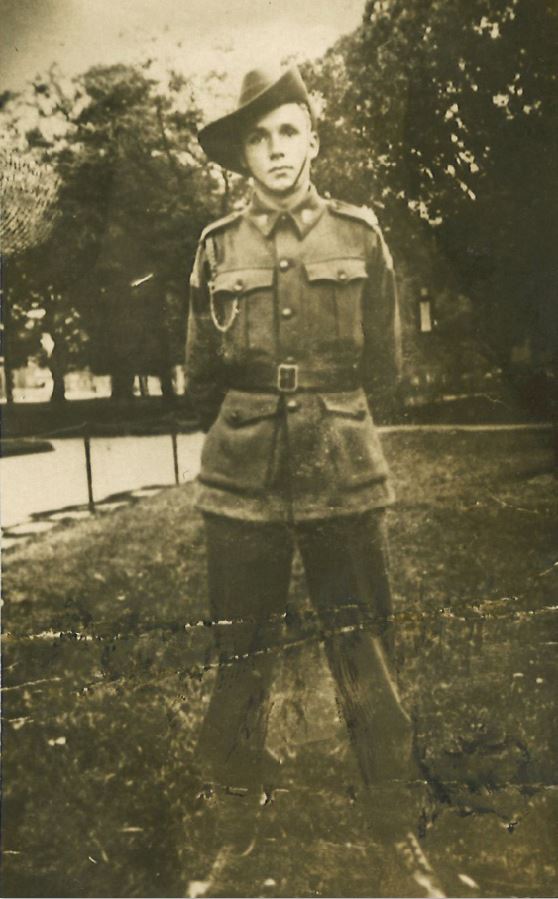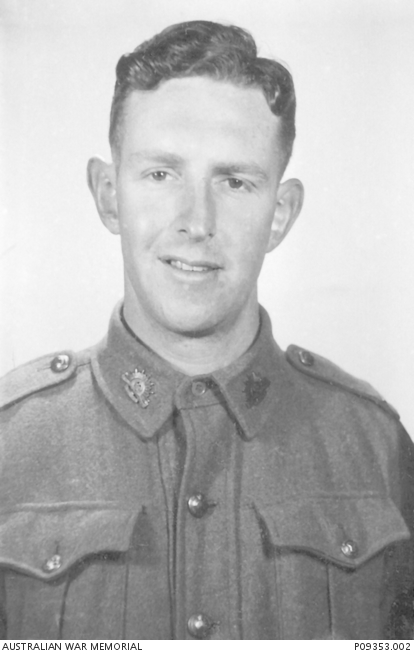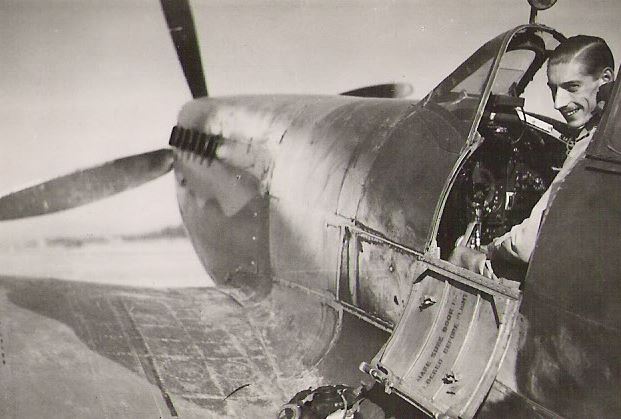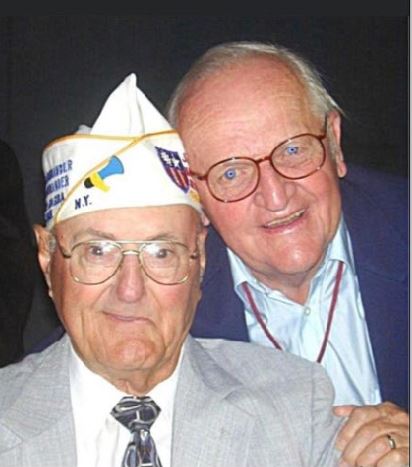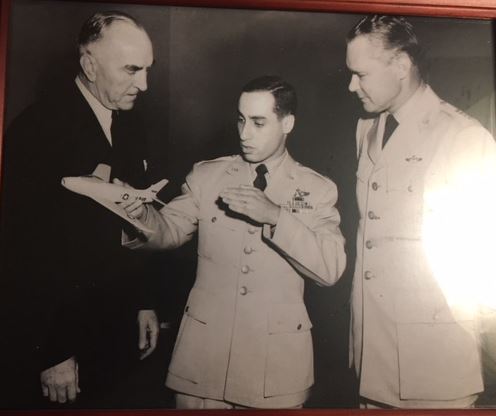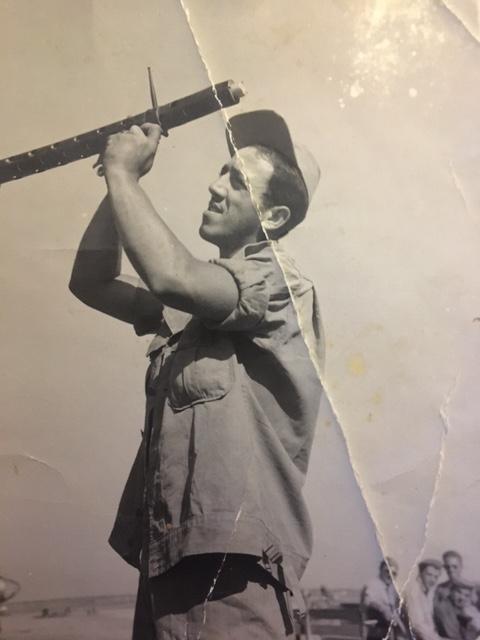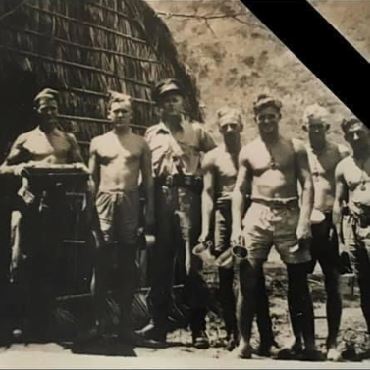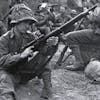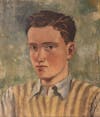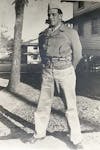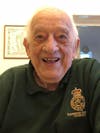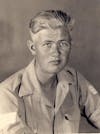64 Leslie Cook Part 1 - Australian - Burma Memoirs and more
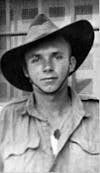
Six full years of an Australian soldier’s war, with all its ups and downs.
Six full years of an Australian soldier’s war, in what I think is one of the finest set of stories you could ever hope to come across - over 80 in all. Don't forget to breathe!
"Two of the attackers had occupied an abandoned weapon-pit on a mound above and behind me, less than 3 metres away. I could hear them, but couldn’t see them. The rain was pouring down and the night was pitch black. If I used a grenade it would probably roll back on me before exploding. If I fired at them there was almost no chance of success, but an absolute certainty that the flash would disclose my presence and result in instant retribution."
"With his ankle smashed by a bullet John Metson was one of many cut off in the jungle. Although badly wounded himself, he led them through the jungle to rejoin the Battalion. To spare his comrades the burden of carrying him, John said that he would crawl, asking only that his hands and knees be bandaged to protect them on the rough tracks".
YouTube channel - Loads of my own videos - Dunkirk Mole, Gold Beach, more ...
Feedback/reviews in Apple Podcasts - Thank you.
Les Cook:


John Metson - hero
Ken Trobe
Francis Patrick Stauble and Nick
Jimmy Jabara, the old gentleman he’s showing how he shot down a MIG is Eddie Rickenbacher who as you know was America’s highest scoring Ace from WW1, founder of Continental Airlines and Pacific raft survivor.
Kraker North Africa in late 1942
Jack Wicks below, 2nd Left. Scroll down for story and more in the full transcription.
Pic above from Sue Polidoro -
Sue Polidoro from Melbourne, Australia
Sue wrote months ago with some very precious family history and I’ve been saving it for the right opportunity.
Hi Paul,
I have been listening to your podcasts and wanted to say thank you! Never should we forget the Greatest Generation, my grandfather fought in both world wars, he was not born, in Australia, but Germany and from Russian and Eastern European descent.
My maiden name was wicks, the name my grandfather chose so he could join up for both world wars - his real name was Weiss - so many changed their name - especially those with Jewish or German names. My uncles and grandfather are all buried with the false name, which they had kept it after the war,
On the breakout of the Second World War he joined up on the first day. And two of his sons joined a year later. My Uncle Jack Wicks fought in New Guinea with 2nd/7th Commando Squadron.
Only a few stories have come through because all the men in the family would not speak of war.
My aunt Margaret, Uncle Jack’s wife, walked in on him and a war mate reminiscing, but they stopped talking when she entered - but she begged them to finish. She stood in terror wanting to know what happened – the conversation went something like “Remember, Jack, when we were in the jungle and you and that Jap walked straight into each other and bumped heads? My Aunt waited with baited breath for the answer … my Uncle was forced to answer … so looked at her and said “Well I am here and he isn’t”
Both men did not say another word till she left the room.
At his funeral that same mate came and spoke, giving us the only other story that we know, My Uncle fought with four other men in teams. Most of what they did is still not known but he said my Uncle got appendicitis and had to walk days to a bush hospital to get it removed.
Because he’d left his team one man down on the day of the operation, straight afterwards he walked back so they would not be short handed. He spoke with reverence at this - I cannot imagine getting my appendix out then walking through one of the hardest jungles in the world for days only to fight on.
My other Uncle was Alex but I do not know much about him, so much history has been taken to the grave because they felt it was too much for women to hear.
"My grandfather fought in both world wars, he was not born, in Australia, but Germany and from Russian and Eastern European descent.
My maiden name was Wicks, the name my grandfather chose so he could join up for both world wars - his real name was Weiss - so many changed their name - especially those with Jewish or German names. My uncles and grandfather are all buried with the false name, which they had kept it after the war,
On the breakout of the Second World War he joined up on the first day. And two of his sons joined a year later. My Uncle Jack Wicks fought in New Guinea with 2nd/7th Commando Squadron.
More great unpublished history!
Second world war
Scroll down to the Transcription section and click Read More to extend show notes.
Interested in Bill Cheall's book? Link here for more information.
Fighting Through from Dunkirk to Hamburg, hardback, paperback and Kindle etc.
Fighting Through Podcast –
Episode 64 – Corporal Les Cook, An Australian in New Guinea and Burma, WW2
More great unpublished history! WWII
Intros
Many of our field exercises involved us being out of camp for a week at a time. During this period we would be almost continuously on the move, marching between 20 and 30 km each day and stopping at a different place each night. Carrying all our gear, weapons, and food we slept on the ground wherever we stopped. The day’s march would be interspersed with other forms of training, including night exercises. As can be imagined, we would be tired and dirty by the time we returned to camp.
My aunt Margaret walked in on Uncle Jack and a war mate reminiscing, but they stopped talking when she entered - but she begged them to finish. She stood in terror wanting to know what happened – the conversation went something like “Remember, Jack, when we were in the jungle and you and that Jap walked straight into each other and bumped heads?
There was an incident involving some newly captured SS soldiers he was guarding after a battle, They were being individually interrogated by a an Intelligence Officer, and being "died in the wool" Nazis, none would "co-operate".Sgt. Salmon managed to parachute out of the plane. Unfortunately, I’m not sure if his boot caught fire or if he had a flashing button on it, but either way he was lighting up the sky as he parachuted to safety. He kicked off his boot hoping the Germans wouldn’t see him.
Two of the attackers had occupied an abandoned weapon-pit on a mound above and behind me, less than 3 metres away. I could hear them, but couldn’t see them. The rain was pouring down and the night was pitch black. If I used a grenade it would probably roll back on me before exploding. If I fired at them there was almost no chance of success, but an absolute certainty that the flash would disclose my presence and result in instant retribution …
With his ankle smashed by a bullet John Metson was one of many cut off in the jungle. Although badly wounded himself, he led them through the jungle to rejoin the Battalion. To spare his comrades the burden of carrying him, John said that he would crawl, asking only that his hands and knees be bandaged to protect them on the rough tracks.
Ooof my word – have I got a cracking episode lined up for you!
Hello again and another warm WW2 welcome to you. I’m Paul Cheall, son of Bill Cheall whose second world war memoirs have been published by Pen and Sword – in FTFDTH.
The aim of these podcasts is to give you the stories behind the story. You’ll hear memoirs and memories of veterans connected to Dad’s war in some way – and much more.
Star of this episode is a brilliant Australian memoir by Les Cook about the war in the far East against the Japanese and you heard a few extracts from that in the intro.
On top of that I’ve got a miraculous survival story about a Canadian airman – a rear gunner - who had to bail out of a Lancaster over Belgium.
And I’ve got another super story from Australia, coincidentally based around New Guinea . About a tough Australian commando who was taken out of action by his appendix and had to walk days to a bush hospital to get it removed.
So it’s very much shaping up to be Australia week in this episode.
So for the following people who’ve written in with feedback in the past, this awesome episode is dedicated to you.
All these people come from Australia:
Victoria
Andrew McLennan,
Tristan James
Gerard Paynter
All four from Brisbane! I don’t think I’ve got even one listener in Norfolk where I live, never mind four together in Australia! You guys will have to meet up for a beer one night and form a FTP appreciation society.
Uncy Pete
Chuk Norris
Rob Callaghan.
And finally Andy Charlie Nanos - Good day mate!
So thanks guys for your support for the show. Enjoy.
Feedback time first
Here’s the first of several messages I got in response to Jean Lindsay’s interview:
Vitor in Portugal wrote in:
Hello Paul.
I'll start by saying that I love your podcast and I've listened to all your episodes, usually while driving between home/work.
It makes me smile a lot and sometimes even a little sad (but it's a good kind of sad).
In this last episode while listening to Jean Lindsay, I was reminded of my own grandmother. It was a tale she told me over 30 years ago, on how she saw a Zeppelin passing her small fishing town (Póvoa de Varzim [Povo de Varzeem] near the city of Oporto) in the 1920's. It was a story that I’d almost forgotten and it made me really happy remembering it ...
I've just ordered a book from you on Amazon.co.uk (good man Vitor) and I'm also writing to ask if you can include a greeting written on it.
It will be my christmas present, so It'll have to wait under the tree for a bit until I read it. ;)
Thank you for all your hard work on the podcast and keep healthy in these Covid times.
My best regards
Vítor Farinha
Vitor thanks so much for that poignant story which was teased out of the mists of your memory by a similar reminiscence from Jean.
Best wishes to you and your son Lucas. The signed book with greeting as requested plus FTP bookmark, souvenir photos and a smile are
on their way to Portugal as I speak.
Following on about Jean’s interview,
Richard Lord - Jean was awesome. What a memory! Very cool hearing about wartime life in Britain from a child's eye.
Danny Turnham - A fantastic episode! It’s great to hear about the war from a different perspective, the Home Front.
Nigel graham – what a wonderful lady
So I reckon that was a firm thumbs up for Jean and I have passed all these comments on to her, for which she was delighted. Thanks everybody
Nick Stauble is going to start the ball rolling on “My relative was in the war” … and I’ve been saving this one for ages because it’s about Burma!
Nick says “I’m from Wilmington North Carolina in the United States. I listen to all of your podcasts when I’m on the road for work. My grandfather served in the United States Army from 1943 through 1945 and served in the china Burma India campaign. He was a member of the flying tigers and served as an anti-aircraft gunner fighting the Japanese.
His name was Francis Patrick Stauble. He was born in 1920 in upstate New York and passed away in Wilmington North Carolina in 2009. One story that I remember him telling specifically is when they were stationed in an area near a river they would use hand grenades to go fishing and a couple of the guys from his unit would go down stream with nets and grab all of the fish.
Another very memorable story that he told to me and my brother was a circumstance in which most of the men from his unit were playing in the river during leisure time when they weren’t on patrol and some Japanese zero planes came overhead and started firing at them.
Due to the hot climate in Burma at the time most of the gentlemen were either only in their boxers or were completely naked and when the Japanese planes came overhead a bunch of the men jumped up on the anti-aircraft guns which were metal and burned their rear ends. My grandpa always said he would never forget to leave his boxers on when he would go swimming after that air raid. He also noted that he can confirm he shot down two planes and two other planes were severely damaged and smoking and were far away from their base. He managed to bring back Japanese officers swords but unfortunately his residence was broken into in the mid-1990s and most of his war time memorabilia was stolen or destroyed.
Nick Stauble
N Carolina
Craig Thomas
UK
I’m currently a serving member of the RAF Regiment, I'm from stockton on tees so listening to stories of our brave local lads fills my chest with pride.
Keep up the fantastic work.
The RAF Regiment are an infantry trained defence force for the RAF we ensure the security of the aircraft, infrastructure and personnel of the Air Force. The Regiments history is rather short - only being formed in 1942 but it does have some good history behind it for such a young corps.
Honestly I haven't stopped listening to your podacsts for over 2 days now. Literally letting them roll back to back one after the other, I'm addicted lol.
I cant remember which episode I was listening too but it had a soldiers letter to his parents. That broke me. Can’t remember the last time I had tears down my cheeks but that letter . . . . Really got me.
I would be elated to hear a shout out to the lads of the RAF Regiment. I’m very proud of the battle honours the Corps has collected throughout the second World War.
Craig Thomas
Norton
Craig thanks for all that, so that’s the shout out for the lads of the RAF regiment, the role they played in the war and the role they play now protecting our airfields.
That letter you referred to by the way is the letter that Canadian pilot Bertie deLaCour sent to his parents to be opened in the even of his death. Very sad. That was in Lancaster Lily Mars episode 14.
And Craig you share a home town with one of Dad’s best mates on the Queen Mary, John Bousfield of the 5 EY, also from Stockton, who was killed by shell fire at the Battle of Wadi akarit, Tunisia in April 43. His Mum ran a pub called the Turks Head in Stockton. Cheers John, cheers Craig!
And one final comment Craig, you talked about addiction to the podcast and you're not the first person! The last few weeks, I've been listening to repeat episodes myself whilst doing chores in the kitchen. Yes, ok, Doing the washing up! I've worked out how to get Alexa to play The Show and and if you have her in a convenient room then you too can listen to the fighting through podcast on your personal voice assistant.
You simply say "Alexa play the fighting through podcast and with a bit of luck she'll play it for you, either picking up where you left off on the previous episode or playing the latest episode.
You can ask her to play the next episode, play the previous episode Play episode 16, or even fast forward 5-minutes etc. She doesn't always co-operate but with a bit of patience you can usually work it out. However, At this stage. She won't wash the dishes or polish your army boots, but we can hope for the future!
Tim Rainville from Canada, in the last episode, discussed remorseful feelings amongst soldiers. Right on cue, here’s a follow-up from the sunshine state:
Ken Meerson said
Paul: Greetings from Central Coast California!
I am a big fan of Fighting Through, and have listened to many episodes while on my hour-long daily walks. I am 73, and have been a student of WWII for as long as I can remember.
Some time ago I was a volunteer guide at our local Veterans Museum for a few years and always partnered up with an elderly Veteran of the 82nd Airborne,
I sat there every week, mesmerized by what he would recall and share with me. The following are some of the things he related:
He had been a Pathfinder, who jumped into Normandy on June5/6. He had previously made combat jumps into Sicily, and several other places. He would later fight his way to the Battle of the Bulge, and jump into Nijmegen, Holland. It was there, where he said he received TWO Purple Hearts on the same day. The first was when he was blown out of the small boat he was in, while trying to paddle across the Rhine.
The second was when the current carried him unconscious back to Allied side of the river. He was loaded onto an ambulance, and on the way to a field hospital, the ambulance was blown up by German artillery, but he somehow survived.
On another occasion there was an incident involving some newly captured SS soldiers he was guarding after a battle, They were being individually interrogated by a "green" G2 (Intelligence) Officer, and being "died in the wool" Nazis, none would "co-operate".
My partner told the G2 Officer not to worry, and proceeded to shoot the first, and then the second prisoner who wouldn't talk!
The third SS man …
decided it was in his best interest to speak. [Shades of Tank Capt Stan Perry that we’ve heard telling of when he had to shoot a prisoner.]
Another time, he told me that an Order had come down, verbally, not to take any SS prisoners. I believe this may have happened after the massacre at Malmedy, and supposedly came from General Gavin.
Among the interesting tidbits he would relate about G.I. life: he said that he, and others in his unit, would take their Army issued M-1 Paratrooper carbines, and file down some pin to make them fully automatic. He then said that when he was in combat, he would remove the butt end of the carbine's strap and let it drop down. He’d then step on it when firing, to keep the muzzle from rising up.
He could sweep from side to side instead, and related that it was an extremely lethal weapon that way.
I bet it was.
In the Museum where we both volunteered, there was a framed photo of a squad of some scary looking paratroopers holding up a captured Nazi flag. It was taken in the little French town that they had just liberated, and the photo is semi-famous. My docent partner is one of the soldiers in that photo.
Anyway, I wish I could remember more, but I thought you might find the above interesting.
Keep those episodes coming and be well. Cheers, Ken M.
Ken thanks very much for writing in.
Am I allowed to tell a joke about the Purple Heart medals that your guy won? It’s about a veteran, Jim. For some years after the war ended, Jim put on his finest uniform and went collecting round his neighbourhood for Veteran’s day and knocked on the door of two old ladies. Betty answers the door and sees Jim standing there, proudly displaying the Purple Heart medal on his chest. She turns and shouts to her friend “Wilma, there’s a soldier at the door and he’s got a purple heart on.”
Wilma said “I don’t care what colour it is Betty, get him in here quick.”
TR
Michelle Stevenson - Facebook
Good morning Paul. Just discovered the podcast and pleased that I’ve now got something to listen to over the next month while on Lockdown!
I visited the GH museum in Richmond a few years ago, they helped me when I started looking into my Grandads history. It’s a shame it’s closed at the moment, but it’s a fantastic place to visit!! I wish I had known my grandad to learn more about his own ww2 accounts.
My Uncle Ted Adamson was with the Tyne Tees Regiments - the fighting 50th Division!
And if you google Ted Adamson and Imperial War Museum, he recorded some of his own adventures during his war years and life as a Hartlepool lad.
Well Michelle I did indeed do that and there’s an extensive interview with your Uncle Ted who was a British gunner and served with Durham Light Infantry in their Searchlight Regt, Royal Artillery and was a driver with the Royal Army Service Corps at various times throughout the entire war, including Britain and Europe
Michelle continues - There’s a pub in Thornaby called The Last Post that serves as a museum to all British armed forces – they have a great facebook page. The oldest pub regular is Tommy - 99 years young! He was a Para who was on the Normandy beaches a true hero to all.
The Podcasts is fantastic!
Michelle
Thank you Michelle
BlueLine on Apple Podcasts USA said, amongst other very nice things “I get goosebumps from the action and I will be on the edge of my seat. Much respect to your father and everything you do, Paul
Mindblowing and incredibly touching - History is not what happened, it's who tells the story". A great way to hear the voices of that generation and genuinely reshape our perception of life during the war.
duoybob from the United Kingdom
via Apple Podcasts
Nicole Callander, from Canada, posted a great story recently on the Lancaster Bomber Group page and I don’t know if it’s spooky or poignant or both!
Nicole said:
I share this story every Remembrance Day as I believe it’s so important to keep telling the stories so we never forget them...
It’s called The Boot Story
December 20, 1943, so like five days before Christmas …
My Grandfather, RCAF Sgt. Salmon was scheduled to complete a mission over Frankfurt. He was rear gunner in a Lancaster bomber. The plane was reported missing at 04:05.
The plane had been shot down over Belgium and the crew of 7 lost 2 of their men who were hit by flying debris when the aircraft blew up.
Sgt. Salmon managed to parachute out of the plane. Unfortunately, I’m not sure if his boot caught fire or if he had some warning system on his uniform that was being triggered by his boot – maybe a flashing button - but either way he was lighting up the sky as he parachuted to safety. He kicked off his boot hoping the Germans wouldn’t see him. When he landed, he buried his other boot in the field.
He was found by a Belgium family who were part of the underground resistance. They hid him from the Germans, and in the words of my grandfather,
"It is hard to remember exactly, but I was there nearly a week when I was supposed to go to a house as I was leaving for Spain. But that very night, the Gestapo captured some underground people, some R.A.F. and me.
I was taken to Mechelen near Brussels for a few days and then spent some months in St. Gilles prison. I left for prison camp in May 1944."
Thankfully my grandfather survived the war and returned home safely.
But his story doesn't end there.
In 1991, my grandfather returned to Europe with the remaining crew members of his squadron. The crew were celebrated all over Holland and Belgium and were reminiscing about war times and the plane being shot down and my grandfather recounted his boot and how he worried the Germans would see it in the sky.
A man was listening to his story. A while later, he came up to my grandfather and told him that he had seen the flashing light that night. He thought my grandfather was signalling for help but when he went to look, all he found was a boot. It was the boot my grandfather had buried after he landed with his parachute.
At this point … he returned my grandfather’s boot to him, 50 years later!
I now have the infamous boot.
But the story doesn’t end there either:
When my grandfather died in 1997, I wrote a tribute on the internet on Remembrance Day about how he had his boot returned 50 years later... I worked for an American Company at the time who had an office in Canada.
Seven years after I wrote the tribute, my name appeared in our company newsletter. I received an email from our head office in Wisconsin USA asking if I was the girl in Canada a certain gentleman was looking for. The gentleman was in Belgium and he had seen my name in the newsletter when he googled me.
He was looking for me as it was HIS family that was part of the underground resistance that had hidden my grandfather. He had documents and pictures of him!
I’ve been very fortunate as my great grandparents saved everything. I have the boot, the original log book, all the letters sent from the government telling my great grandparents that he was lost at war and then about becoming a POW etc.
Nicole Callander, Lancaster Bomber Group
PS - I live in the same city in Canada where the second flying Lancaster is located – Hamilton, Ontario, Canada and I’ll be watching her take flight today and so many other days!
I looked Nicole’s plane up in and apparently it’s known as the Mynarski Lancaster, the Canadian bomber sports "KB726 VRA" markings on its right side in honour of Pilot Officer Andrew Mynarski, recipient of the Victoria Cross as part of the 419 Squadron, Royal Canadian Air Force.
How very good is all that!?
Link … (done)
Scott Kraker
Tx
Follow up from the Q Mary episode 30!!
One of the stories in that episode was about HMS Curacao and the devastating collision which took place between her and the QM who was returning to Glasgow from New York.
This is what Scott said:
My Dad was an ordinance Tech Sgt in the 320th Bomb Group (B-26 Marauders) and was on board Queen Mary on October 2, 1943 when she hit the Curacao.
He was 21yo and was with 1,200 members of the ground echelon on their way to North Africa via Scotland.
One morning in the early seventies we were sitting talking WW2. He mentioned crossing the Atlantic on the Queen Mary and how crowded it was and how there were rumors about all kinds of crazy stuff going around - but there was one about the Queen Mary, hitting another ship.
He said he thought nothing of it because of all the gossip but when they disembarked he noticed the bow of the ship was crushed in. That’s all he ever knew about it because of wartime secrecy. I was in high school at the time and a WW2 buff and shortly after that I read about the incident in a Sea Classics Magazine.
Dad ended up in Tunisia, Sardinia, Corsica, Dijon, and Nuremberg. So our dads were both in Tunisia although my dad only had to deal with the mud, not Nazi’s.
He and Mom had got married the day before he shipped out. He got a letter every day and sent every check home to her. He was in a tent with a bunch of Italian boys from Brooklyn who taught him how to shoot craps. He gambled for his drinking money and when he got home in late ’45 Mom had kept every single check he had sent home and they used that to start their business. They adopted me in ’57.
My dad’s side of the family emigrated from Lebanon in the early 1900’s. to escape the Turks. His parents were adolescents when they emigrated and I understand that their marriage was an arranged one.
The US let in 20k Lebanese and The family settled in Oklahoma and opened a department store in various small towns. They eventually settled in Okmulgee. (capital of the five civilized tribes).
I used to walk to the Council House downtown when I visited my grandmother on my mom’s side as a kid and when I crossed from the street to the grass I was leaving the United states and entering Indian Territory.
I thought that was so cool, about a block from my Grandmother’s house.
So there was my grandmother with four boys and a mother in law to support and she couldn’t read or write English. Then the sheriff of the town came in and basically stole the business from an immigrant woman.
She started over on credit - and in the midst of the depression had a successful lady’s ready to wear shop.
There is a hierarchy among siblings in middle eastern culture. Al (the first born) became the head of the house and managed the revenue from the business
The number two son got an education at the University of Oklahoma. Dad was the youngest and I think that left him with a chip on his shoulder which motivated him to prove himself his whole life. He was a fighter.
My grandmother did all that by herself in the midst of the depression. Often she was paid in goats or chickens so food was never a problem. Dad said she was so determined she would have him drive her to Dallas to the big Apparel Market in her Model A across flooded streams.
Anyway Dec 7th 1941 comes (Pearl Harbour). Three brothers enlisted.
Dad was overseas in the Air Corps. His older brothers served in the States one retiring a full bird Colonel.
Dad and Mom were high school sweethearts and when dad was training in Tampa Bay she went to Tampa too.
She got a job at a 10 cent store and an efficiency apartment.
Cousin Jimmy Jabara was a P-51 pilot in Europe. He got a couple of kills and was involved in a mid-air that killed the other pilot. He went on to become America’s first jet ace in Korea and finished with 15 ½ Migs to his credit. They sent him home for PR campaigns or he would have finished way ahead of Joe McConnell who finished with 16 kills.
To finish with Jimmy, he was eventually a base and wing commander at ironically McConnell field in Wichita Kansas. Joe McConnell had been killed as a test pilot.
Jimmy always had a cigar in his mouth and cussed like a sailor. He was just like a movie star to me. We took him to the airport in OKC once and he flew off in his own F-4 phantom and waggled his wings at us.
One day he and his family were driving to Florida from where he was to take his wing over to Vietnam.
Going through some construction on the highway there was a grassfire and smoke. His daughter was driving him when they crashed and both were killed.
You know it was the old WW2 pilots who knew how to dogfight that were successful in Vietnam. And he had flown a couple of unauthorized missions over there.
After the war Dad and mom opened a little neighborhood grocery. He and his partner worked and worried harder than anybody and did real well.
In 1957 they adopted me from the State Orphanage in Oklahoma
They finished with three stores and turned down every opportunity to get any bigger, they were content.
Mom and Dad died some years ago. I’ve had no children myself so I feel like the last of the Mohicans most days.
Take it easy Paul,
N. Scott Kraker
Houston, Tx
Scott thanks for all that. I can tell that you’re rightly proud of your family’s heritage, going from rags to riches whilst honourably doing their bit for the war effort.
There are photos in the show notes at FTP
TR
Listener just a bit of necessary background here:
Thanks Wiki
The Kokoda Track campaign was part of the Pacific War of World War II fought in 1942 in what was then the Australian Territory of Papua, New Guinea.
In a nutshell, the Australian troops were under equipped and a "crisis of command" resulted, which resulted in the sackings of three high-ranking Australian officers owing to their underestimation of the conditions under which the campaign was fought—to the detriment of the troops committed to the fighting.
The Kokoda Track campaign has been mythol-ogised into the Anzac legend.
While the Gallipoli Campaign of World War I was Australia's first military test as a new nation, the fighting during the Kokoda campaign represents the first time in the nation's history that its security was directly threatened.
Sue adds to her story - This is a letter sent to us by my Uncle Jack Wicks’s army mate. It details the story about his appendix operation and gives us an insight into the fighting.
John Peter (Jack) Wicks
Born 3.9.1920
Enlisted 29.9.41 Joined 2/3 Cavalry Commando Squadron, 'C' Company
Embarked 17.12.41 on SS Orbista for French New Caledonia and was stationed there from 23.12.41 to 3.8.42 to protect the nickel mines in case of a Japanese landing.
Caches of food and ammunition were buried so that a sustained guerilla action could be fought against the Japanese if required. In mid February 1942 Jack became sick and his C.O, Cap't Ken Gill, sent him to company HQ some 80 miles away in the only truck available.
The M.D. Doc Patrick, found Jack to be suffering from severe peritonitis and operated immediately in a tent, with the C.O holding a torch and a tilley lamp. In spite of this, a week later, Jack was back in C Company because he wanted to be with his mates so that he didn't let them down. (official daily war diary Cap't Ken Gill).
3.8.42 Left French New Caledonia and returned to Australia for further training and re-kit.
Embarked in mid January 1943 on the S.S. Torina and arrived in Port Moresby on the 21.1.43 just as a hundred plane Japanese air-raid started.
By the time everyone was off the ship and the air-raid was over, it was discovered that the sailors from the S.S. Torina had "Souvenired" numerous items of kit and most of the officers had "lost" their revolvers.
29.1.43 They were flown into Wau, from there, walked to Salamau. 300 men of the 2/3 went on this mission and for the next 100 days they were in continuous action against the enemy.
The casualties were 58 K.I.A, 119 W.I.A and a large number evacuated sick.
Not a lot walked back to the base 14 weeks later.
16.9.43 Sent back to Australia to be rested, re-trained and then put back into the jungle of New Guinea for small scale guerilla warfare behind the enemy lines.
Whilst in New Guinea, Jack suffered from beri-beri, malaria and dysentery as well as falling from a rope whilst climbing a cliff. This fall injured his back and his hips, and these injuries remained with him for the rest of his life.
Sue continues:
My uncle Jack Wicks fought on the Kokoda track. He caught TB of the spine there and spent months in a body cast in hospital after the war.
My uncle is my hero, they were outnumbered but they fought for us.
Kindest regards Sue Polidoro
Sunbury, Melbourne Australia
Sue what a stunning record you’ve sent in. Thank you so much for your efforts in compiling it.
I’ve only got one thing to add to this. And that is to say: How good is that?!
Apart from also mentioning that if you want to get the full narrative on the Kokoda trail and all that surrounded those events, you really need to start with Wikipedia and maybe go on from there because it’s too complex for me to dissect in the time I’ve got.
But, if you want more flavour to the Aussies fighting in WW2, I’m now going to turn to the main event.
War Stuff
You may have heard me previously recommend a TV programme in the UK at the moment, it’s The repair shop, where skilled craftspeople perform miracles repairing what might be most peoples’ rubbish, but others’ most precious heirlooms. It’s out with a new series 5, and I watched episode 7 the other night.
They have recently had a rash of war related repairs because in this most recent episode we’ve seen them restore a beautiful child’s dolly. It had been damaged by a bomb during the Blitz.
And did you know that in Britain, when the second world war broke out, all the road signs and place signs were removed and hidden by the local people so any invading Germans couldn’t know where they were too easily? We saw the Barrington school sign being refurbished. And it showed where certain place names had been blacked out all those years ago.
Finally there was a well-loved, well-used gents grooming kit brought back to life. It had been given by a young woman to her fiancé when he went away to fight.
Poignant or what?
So that’s The Repair shop, series 5 ep 7 BBC1, hopefully on a catch up channel near you.
TR
There are only two flying Lancasters left in the world, in Canada and England. In the next few years there’s going to be a third if Lincolnshire Aviation Heritage Centre carries on their good work restoring Lancaster NX611. Read more about it and possibly donate to help fund their work - there’s a link in the shownotes.
Finally, another recommendation for some very fine WW2 listening. History Extra podcast: A secret WW2 wargame – an absolutely fascinating story about how Britain won the war in the Atlantic against the German U-boat tactics for sinking allied warships who were bringing desperately-needed supplies from America. This is a talk from Simon Parkin who describes how a team of unlikely Heroes develops a battleship-like wargame in order to crack German U-boat Tactics at the height of the battle of the Atlantic. Find History Extra podcast: A secret WW2 wargame on your favourite podcast player.
Big TR
Youre listening Fighting Through Podcast –
Episode 64 – Corporal Les Cook, An Australian in New Guinea,
Corporal Leslie Cook
Tony Trobe wrote in ages ago
Hi Paul
I am an English architect who has lived in Canberra, Australia since 1984 after running out of money on a round the world trip. I stayed and married an Australian woman, Debbie Cook whose father fought in WW2.
Leslie Eric Cook was in the second 14th. And he served in Greece, Crete, Kokoda (the New Guinea Owen Stanley campaign), Borneo and in the occupation forces in Japan.
He has written many stories of his war experiences, mostly on the lighter side.
He is 96, still cycling everywhere and is still a very accurate and amusing raconteur
I follow your podcasts and although they mainly concentrate on the European and North African theatres, these stories may be of interest to you as a change of pace? I have no doubt included far too many stories but I thought I would just dump the whole lot down for you to cherry-pick and see if there is anything that catches your eye.
I have extracted the contents of one of the stories below about Corporal John Metson which is a pretty good example (…but in this case less on the light side!).
As a side issue, my own dad (Ken Trobe) flew Spitfires and Hurricanes in the war mostly training in Canada but never actually shot at anybody in anger.
I’m now going to read Les Cook’s afore-mentioned tribute to comrade John Metson:
>>>>
I now invite you to dive in and soak up some fine stories covering six full years of an Australian soldier’s war, with all its ups and downs.
I’ve ranked the stories as best as I can in date order and they range from dramatic to funny. And particularly nice for me, there are quite a lot of parallels with Dad’s and veteran Wilf Shaw’s wars too – you’ll see why.
Here goes, Cpl Les Cook
Feedback
Interlude
You’re listening to the Fighting Through Podcast, Episode xx Ray Fitchett – Great Unpublished History –
WW2 and WWII
Thank you so very much for your support and for making the time to listen to me.
www.Fightingthroughpodcast.co.uk
You’ve been listening to the Fighting Through WW2 History Podcast, Episode 64 Corp Les Cooke – More Great Unpublished History –
That's it for now chum. Thank you so much for your support and for making the time to listen to me. There’s a PS coming up with another of Les’s many stories - this time about bullying. And I've got many more stories to share with you in the next few episodes of the fighting through podcast.
Next time were going to move onto 1941 and beyond in Greece and Syria.
For now, please do stay safe during the covid pandemic and I wish you a great festive season despite everything. I'm currently working on a rehash of one of my Christmas episodes with some new stories and some very poignant music to go with it.
And if I manage to do it before Christmas I'll put it straight out into the feed, so keep your eyes and ears peeled sergeant!
PS
Here’s Les talking about bullying …
I'm Paul Cheall saying bye bye now and I wish you a very Merry Christmas.
Thank you so much for listening. Please do hear me next time.
Featured Episodes
If you're going to binge, best start at No 1, Dunkirk, the most popular episode of all. Welcome! Paul.
PS. Just swipe left to browse if you're on mobile.










